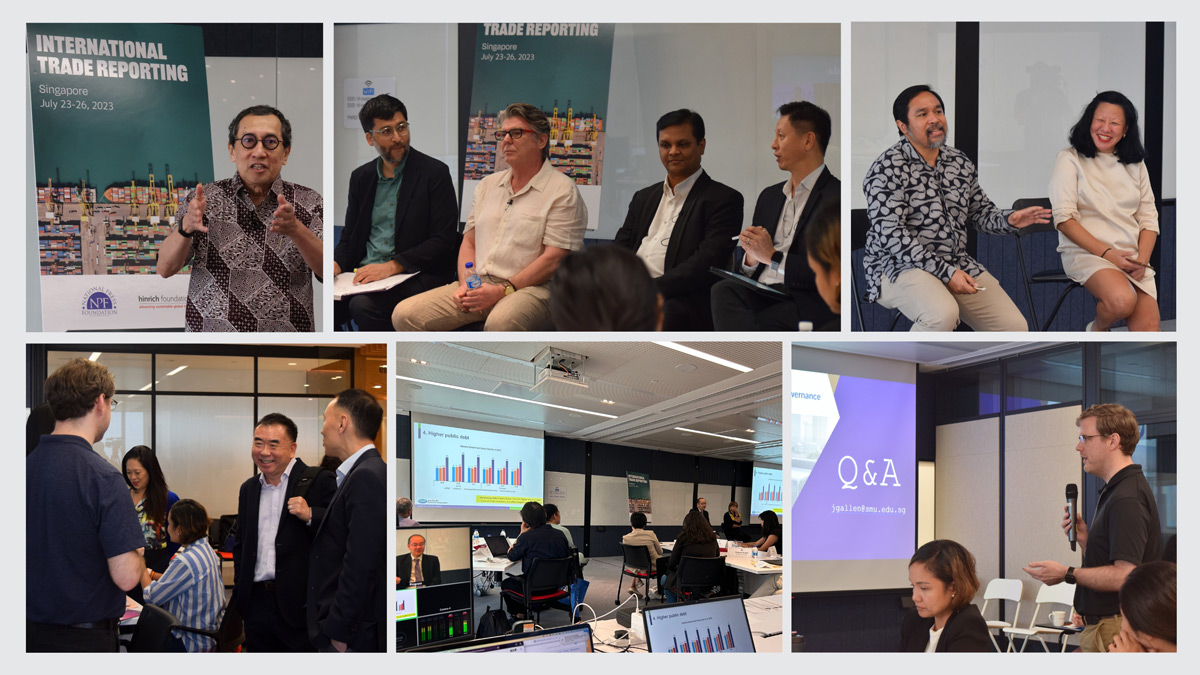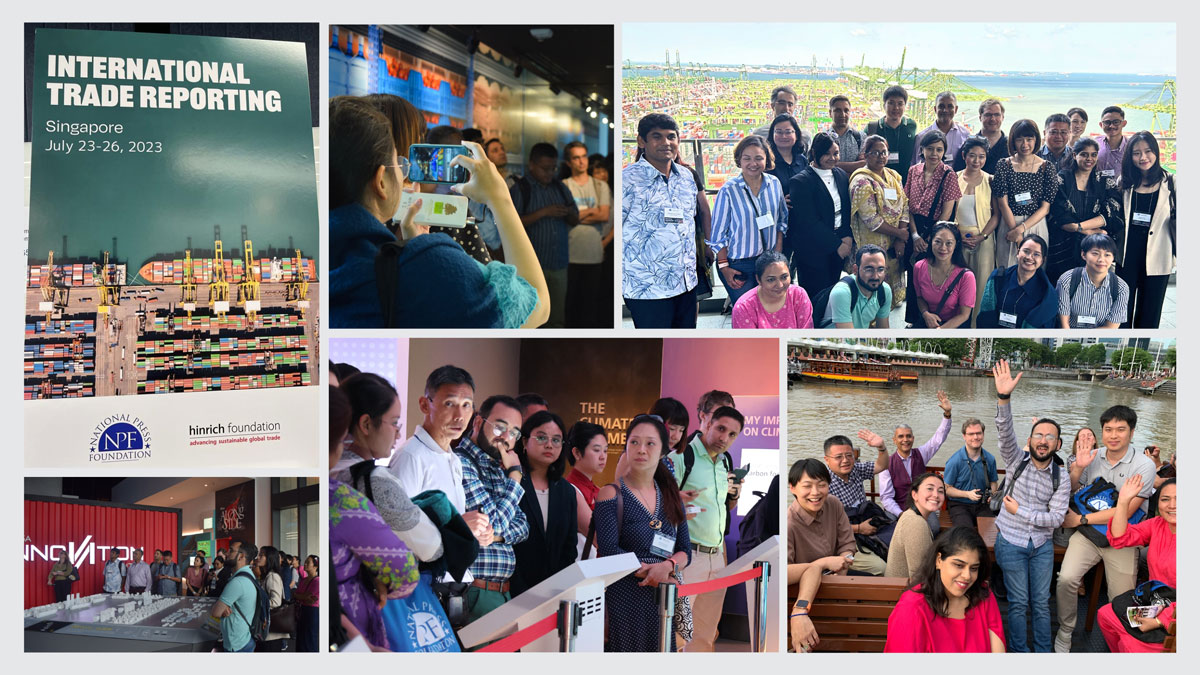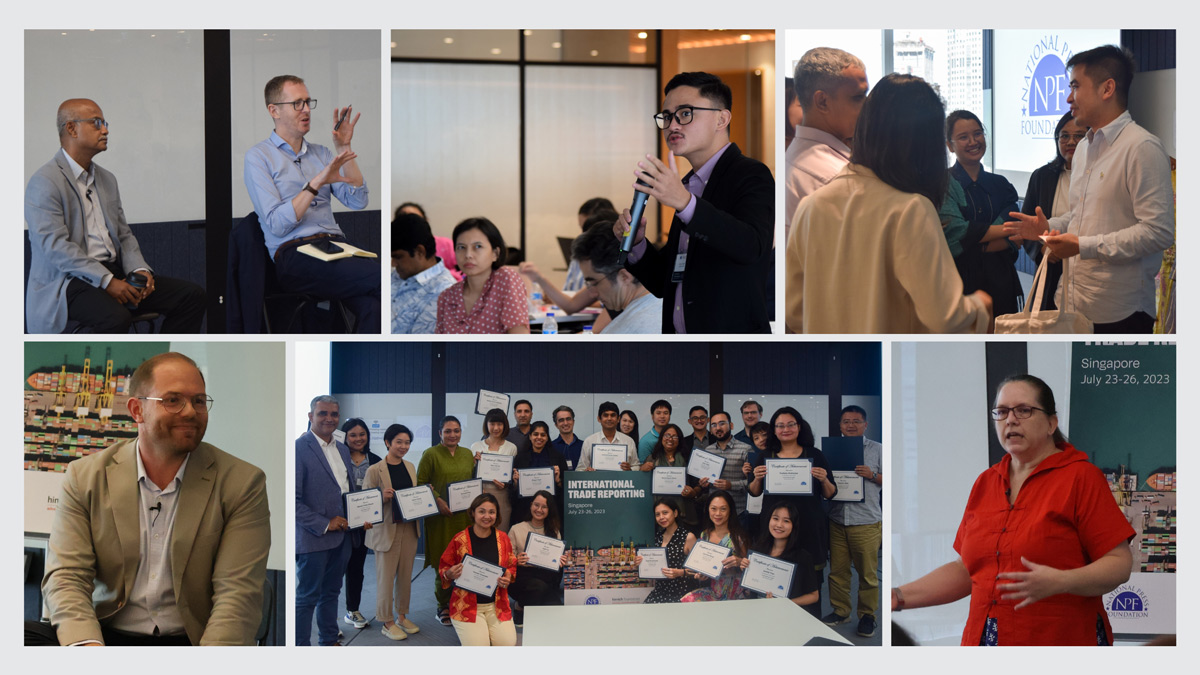MEDIA EDUCATION
NPF International Trade Fellowship 2023
The National Press Foundation holds an annual International Trade Fellowship workshop for journalists sponsored by the Hinrich Foundation.
This year, we welcomed 24 Asia-based journalists to the fellowship at the Hinrich Foundation offices in Singapore. The sessions focused on US-China geopolitics, AI’s impact on trade, global shifts in supply chains, and more.
The training kicked off at the Hinrich Foundation office in Singapore with a welcome address by President of the Washington, D.C.-based National Press Foundation Anne Godlasky and the Hinrich Foundation’s research director Chuin Wei Yap. Senior Research Fellow Stephen Olson’s keynote addressed the rising trend of using trade policy to accomplish non-trade objectives. In a wide-ranging discussion, Olson highlighted the economic rivalry between the US and China and the increasing weaponization of global trade.
In the panels that followed, former Singapore ambassador Bilahari Kausikan, one of the country’s foremost strategic thinkers, unpacked the geoeconomic impact of US-China rivalry, the war in Ukraine, China’s Belt and Road Initiative failures, and the geopolitical conundrums surrounding the Taiwan Strait.
Rebecca Fatima Sta Maria and Carlos Kuriyama from the Asia-Pacific Economic Cooperation (APEC) Secretariat and the APEC Policy Support Unit discussed APEC’s role in facilitating sustainable trade.
Jason Grant Allen from the Centre for AI & Data Governance at the Singapore Management University highlighted the increasingly important role of artificial intelligence in facilitating cross-border trade and the inevitable need for a standardized global regulatory framework.
Amitendu Palit of the Institute of South Asian Studies at the National University of Singapore and James Crabtree from the International Institute for Strategic Studies examined India’s potential, policy and strategic options as an emerging contender as a power broker in an increasingly fractious world.
Economists from the National University of Singapore and the Chinese University of Hong Kong deliberated the impact of the US-China trade war and discussed the viability of the existing strategies to reduce over-dependence on China. Denis Hew from Singapore’s Lee Kuan Yew School of Public Policy brought Fellows through a history of the ASEAN Economic Community, a regional aim to become a European-style common market, and whether the prospects of such a goal was realistic.
The four-day session wrapped on 26 July with panels on the hot-button issues such as challenges to globalization and supply chains by Deborah Elms of the Singapore-based Asian Trade Centre. Elms discussed a wide array of topics from climate-related shipping to the geopolitical impact of the South China Sea dispute on trade.
The training sessions included field visits to Singapore’s Marina Barrage, a massive dam to address the island-state’s many water-related challenges, and the Port of Singapore, the world’s busiest trans-shipment port.
International trade transcends bottom lines
From human rights to climate, trade agreements are now used "to advance a whole bunch of stuff that has nothing to do with trade," said Hinrich Foundation Senior Research Fellow Stephen Olson.
Digging into data: Atlas of Economic Complexity
Annie White and Tim Cheston of the Harvard Growth Lab walked the fellows through Atlas of Economic Complexity, the Lab’s research and data visualization tool used to understand the economic dynamics and new growth opportunities for every country worldwide.
China's trade war: What's next?
China’s skyrocketing economic growth and influence have altered labor markets and consumer experience permanently say economists Sanjana Goswami and Jing Wu.
How AI will revolutionize trade
To revolutionize international trade, AI must be based on good data, says Jason Grant Allen of Singapore Management University.
APEC & trade sustainability
Even weather can disrupt trade, says Carlos Kuriyama of the Asia-Pacific Economic Cooperation.
India’s strategy as an emerging Great Power
Global trade can become more India-focused as it drives growth through selective manufacturing industries, say Amitendu Palit of the Institute of South Asian Studies and James Crabtree of the International Institute for Strategic Studies.
Challenges to realizing the ASEAN Economic Community by 2025
Many expect pragmatism from ASEAN and this expectation needs to be clarified, says Denis Hew of the Lee Kuan Yew School of Public Policy.
US-China and beyond in a world of overlapping crises
China and the US are both vital, irreplaceable parts of one global system and despite the geopolitical tensions China and the US are not heading on a trajectory toward war, says Bilahari Kausikan, former Permanent Secretary for Singapore’s Ministry of Foreign Affairs.
Trade industry lacks key data
Established companies are often “clueless about trade agreements,” said Deborah Elms of the Asian Trade Center.
Climate change can help solve food security worries
Addressing climate change can not only solve some of the world’s most pressing challenges but also create jobs and investment opportunities. Singapore Ministry of Sustainability and the Environment’s Lim Tuang Liang, Cessar Jung-Harada of the Singapore Institute of Technology; and climate experts Syed Mubarak and Aurel Moise explain how.













